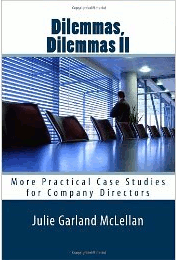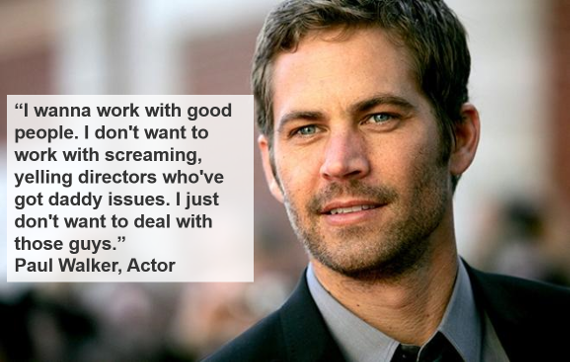Book review - Dilemmas Dilemmas II

This book by one of Australia's leading boardroom experts allows directors to practise and develop their judgement. Contributions from international governance experts, including directors, advisers, consultants and academics provide insights that extend and enhance the ability of the reader to respond to situations that arise in boardrooms. Directorship is about judgement and this book provides a range of responses from which readers can rapidly assess and enhance their own responses to more effectively meet the challenges of their own board roles. These case studies are drawn from real life. They are up-to-date, entertaining and educational. They will make you a better director! With contributions from around the world and examples of applying good governance to commercial, family, not-for-profit and government sector boards this book is an authoritative and comprehensive source of
inspiration for experienced and aspiring directors.
Available in soft or paperback format through Amazon.com
What's New - In June

The biggest event in my June calendar was the Bounty Mining IPO on the ASX; 19 June (at 11.00am precisely). Such a delight after all those months of work and worry to see the stock start to trade and trend upwards. In the photo you can see our long-suffering (and now equally happy) Company Secretary ringing the ASX Bell whilst our Chairman looks on. Such a happy occasion and well worth all the sleepless nights and hours of poring over disclosure documents to make sure everything was perfect (which it was in the end but not in the beginning).
If anyone wants some director education on the role of the board in an IPO I will be happy to oblige just as soon as I recover!
The month started with a trip to Tasmania for some board performance reviews and a strategy workshop. Both were high on my list of good fun professional activities.
I also had the joy of presenting two Advanced Club Governance Courses for Clubs NSW. It is always a pleasure to meet people who volunteer for Not For Profit board service and especially when they move beyond the mandatory governance training (there is a minimum education required to be on the board of a registered club in NSW as a legislated requirement) and sign up voluntarily to learn how better to serve.
 On 15 June I travelled by Tall Ship across the Sydney harbour to hear a presentation on sustainability and governance at Taronga Zoo.
On 15 June I travelled by Tall Ship across the Sydney harbour to hear a presentation on sustainability and governance at Taronga Zoo.
This was one of the most enjoyable ways to learn. In the picture you can see AICD Chair, Elizabeth Proust, enjoying the cool breeze (okay - freezing along with everyone else).
Add in my usual board and committee meetings and the great joy of writing this newsletter and it was another fulfilling and busy month. Good job I love my work!
I am always keen to work more and will be delighted to hear from you if you would like to arrange a board strategy workshop, education session, or board performance review!
Inspirational quote for July - This month my favourite quote is:

Reader Highlight - This month our 'Reader doing exciting things' is Sonny Wang, CEO of the Taiwan Corporate Governance Association. I am looking forward to returning to Taiwan for the annual corporate governance summit in September. It is a massive job to bring together such a cast of international governance experts and it really helps to raise the standard of governance, not just in Taiwan, but all around the world.
A note on names - A few readers have asked me where I find the names for the protagonists in each case study; I 'borrow' them from people I meet or things that I read. Bill is an old English name, it is a derivative of William and means 'resolute protector'. Our protagonist this month has been a resolute protector of his business through several iterations and many years. I wish him continued and great success. He will recognise himself in this story. Hopefully no-one else will.
This newsletter - If you have any ideas for improving the newsletter please let me know. If you are reading a forwarded copy please visit my website and sign up for your own subscription.
Suggestions for dilemmas - Thank you to all the readers who have suggested dilemmas. They are greatly appreciated. I will answer them all eventually. I could not write this newsletter without your help and without the generous help of all the experts who respond each month to the case studies.
Be a contributor - if you would like to attempt a response to the dilemmas for publication you will be most welcome. Simply reply to this email and let me know.
Let's connect - I use LinkedIn to share information about boards and directorship with my friends and acquaintances. If you use LinkedIn and we are not yet connected I will welcome a connection from you. You can find me at linkedin.com/in/juliegarlandmclellan.
Let me help you - If you would like me to speak to or train your board, staff, audience and/or group please contact me at julie@mclellan.com.au.
Farewell until the next issue (due 1 August 2018). I look forward to greeting you again then. In the interim I hope you will enjoy health, happiness and hard work.
Enjoy governing your corporations; we are privileged to do what we do!
Best regards,
Julie
 Zefco is a regional supplier of building materials. At the peak of the housing boom, Bill sold the business to a NYSE-listed corporation. The new owner retained the Zefco brand. Bill was asked to continue running the company. After the deal closed, he was in a financial position to live very comfortably without ever having to work again, but he loved the business and he agreed to remain as CEO.
Zefco is a regional supplier of building materials. At the peak of the housing boom, Bill sold the business to a NYSE-listed corporation. The new owner retained the Zefco brand. Bill was asked to continue running the company. After the deal closed, he was in a financial position to live very comfortably without ever having to work again, but he loved the business and he agreed to remain as CEO.
 Given Bill's age and his decades of experience in the ups and downs of the home building industry, he should definitely be reluctant to use most of his own capital to buy back Zefco. Asset-based lenders should be willing to evaluate the opportunity. Although Zefco's income statement is not very attractive, the company probably has substantial A/R and inventory. Applying the typical advance rates against the collateral a maximum senior, secured revolving credit facility of $28,000,000 might be available. Bill would likely be asked to invest $7,000,000 of his own money and provide the lender with an unconditional personal guaranty for the full amount of the loan. Given a
pro forma 4:1 debt-to-worth ratio, requiring the personal guarantee would not be unreasonable from the lender's perspective.
Given Bill's age and his decades of experience in the ups and downs of the home building industry, he should definitely be reluctant to use most of his own capital to buy back Zefco. Asset-based lenders should be willing to evaluate the opportunity. Although Zefco's income statement is not very attractive, the company probably has substantial A/R and inventory. Applying the typical advance rates against the collateral a maximum senior, secured revolving credit facility of $28,000,000 might be available. Bill would likely be asked to invest $7,000,000 of his own money and provide the lender with an unconditional personal guaranty for the full amount of the loan. Given a
pro forma 4:1 debt-to-worth ratio, requiring the personal guarantee would not be unreasonable from the lender's perspective.
 Bill,
Bill,

 On 15 June I travelled by Tall Ship across the Sydney harbour to hear a presentation on sustainability and governance at Taronga Zoo.
On 15 June I travelled by Tall Ship across the Sydney harbour to hear a presentation on sustainability and governance at Taronga Zoo.

